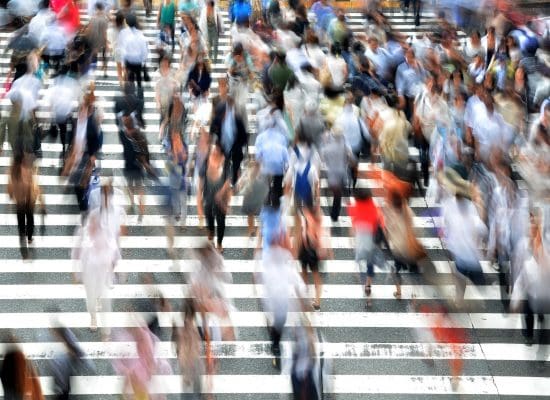Featured Photo: Female Activist | © Shutterstock
Some think that an angry citizen is the pure counterpart of the courageous citizen, who you can always find in difficult times and who, despite or perhaps because of the prevailing oppressive situation on site, speaks up and demands his very own civil rights.
As very good examples, the Mutual citizen from China — and here in particular Hong Kong — or the Russian Federation, who are murdered by the state for their actions, or at least imprisoned, raped or tortured.
Angry citizens, on the other hand, are more likely to be found in our open societies, where they are allowed to loudly express their perceived or actual outrage in all conceivable places and are also making use of this right more and more often.
The mistake here is to see these angry citizens as the counterpart to the courageous citizen, because the counterpart to the courageous citizen is actually the “don't care citizen”, precisely that citizen who doesn't care about anything as long as he somehow gets his basic needs covered (primary processor) or if possible can maximize his own profits undisturbed (crisis winners); just as indifference, not hate, is the opposite of love.
So what defines the angry citizen?
An angry citizen is a citizen who, firstly, cares about “his state” and, secondly, is not at all satisfied with the current situation in the country. And thirdly, there is the powerlessness that he no longer believes in being able to achieve change on the democratic paths he has taken so far, and some of them are very well-trodden.
What is really bad about it is that the problems affecting society as a whole in our country have now become so large, diverse and extensive that the citizens as a whole hardly believe they can bring about a positive change - the continuing fall in voter turnout numbers can be seen as an indication of this will.
Even worse is that the "silent majority" of the citizenry are born as "egal-citizens" and continue to cling to the mistaken belief that it will be enough, at least for themselves. The declining membership of all political parties and the prayer wheel-like assurances that pensions are secure are two indications of this.
But the worst thing is that although parliaments and administrations are now bursting at the seams and more and more state, semi-state and state-dependent institutions are being created, which are turning a "healthy" percentage relationship between the state apparatus and the citizenry more and more to the bad - which ultimately harms all citizens incapacitated and on the other hand it is priceless – Existing and future problems in society as a whole are neither addressed nor sought for feasible solutions.
Exactly this lack of future viability and the apparent unwillingness of those currently acting to even think about solutions — which, by the way, government politicians are always happy to peddle ("Solutions to known problems are only sought when it is specifically demanded by the Bild newspaper for weeks. ’), driving interested citizens to despair. Even if I am convinced that it is not unwillingness but only sheer incompetence on the part of the people responsible, it does not change the effects.
And even if a citizen tries to bring about changes by “marching through the authorities” — better: “through the parties”, he quickly has to realize that he alone has no chance of even contributing his knowledge and expertise there can, because this is not asked at all in principle, nor relevant for parties in any way; they are now dealing with themselves and the regulations and traditions they have created — a world of its own that has lost any connection to reality.
For the second alternative, a "march through the administrations and apparatuses", the intention and the attempt usually come too late to be able to achieve anything, because the bureaucracy has been recruiting itself for a long time. And at the latest when you realize their two credos " an administration can never be big enough, and the citizen is there for the administration”, one is persona non grata there.
The third alternative, namely founding your own party or even a movement, is not only very, very tedious and laborious, but is at least viewed with suspicion from all sides. And here, too, if you follow this path, then at a very young age and with a high level of self-sacrifice.
So usually only the fourth alternative remains, the occupation of public space (virtual and actual), whereby in open societies this is also rightly there for everyone and therefore occupying it is more difficult than expected.
It is now this occupation of public space that many angry citizens have made their task. And with enough verve, strength and perseverance, they will also be able to become effective in an open society and bring about changes.
However, it must be clear to every angry citizen that this path is at least as difficult and rocky as the other alternatives. Since, unlike established parties and institutions, public space does not have its own rules, these must be created at least rudimentarily in order to ultimately be able to generate and pass on public opinion. To make matters worse, this public space is shared with all other creatures, whether they wear aluminum hats or announce the twilight of the gods, and the conversations, discussions, coordination and documentation processes that are absolutely necessary here among people therefore take much longer than usual.
Ultimately, however, it is worth all the effort, because it may shake up some of the "no matter-citizens", but will certainly force parties and institutions to act on their own in the medium to long term, so as not to fall further into insignificance themselves.
And it is precisely this courage to deal with internal social conflicts that, in my opinion, characterizes the angry citizen, and in the event that most of the angry citizens value freedom and democracy per se, will lead to our society starting to move again, both now and in the future Acknowledges problems and looks for viable solutions together.
It would be wonderful if we could live through all of this on the basis of our existing free democratic basic order, because this saves us all the existential question of whether we would also be courageous citizens when it came down to it!
Since the 2nd Hertenstein Talks in 2018, we have also been trying to get closer to the "phenomenon" of angry citizens and to better fathom their origin, meaning and purpose. We started with a first round of talks on the topic "People, their needs and fears as the driving force and limit of politics" and continued this topic in 2019. This year we will address the theme under the title "Europe as a project – what does that mean for Europeans today?' Look at it from a different perspective.
"La politique est la science de la liberté: le government de l'homme par l'homme, sous quelque nom qu' il se déguise, est oppression; la plus haute perfection de la society se trouve dans l'union de l'ordre et de l'anarchie. "
Pierre Joseph Proudhon, Qu'est-ce que la propriété? (1840: 346)





